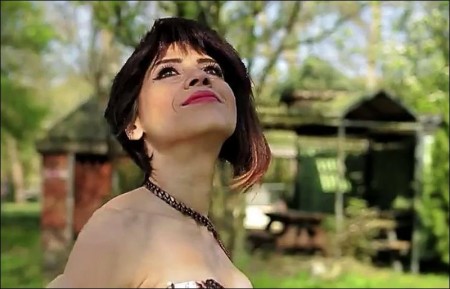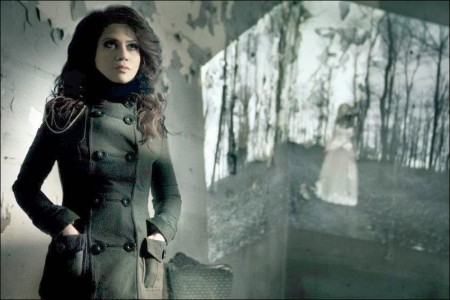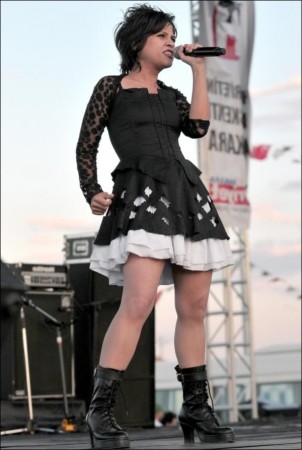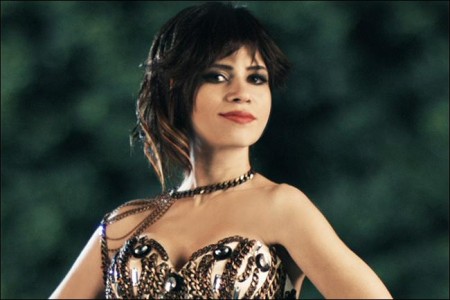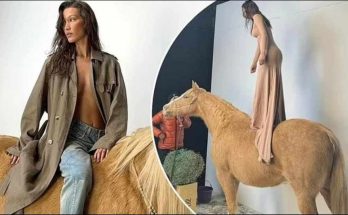Aydilge is one of the most prominent names in the Turkish rock music scene of late, with very distinctive songs and a unique voice. In fact, Aydilge manages to get herself talked about in many arenas, not just in relation to her music. The young singer-songwriter has already written three books, reaching out to an important group of readers.
Aydilge is also active in a number of social responsibility projects, as well as acting as an editor for a music magazine and hosting a weekly radio show on the İstanbul-based radio station Rock FM. Busy in all these different arenas, Aydilge’s third album, “Kilit” (The Lock), was also launched recently. Aydilge talked about her music and her views on life in a recent interview with Sunday’s Zaman.
What does music mean for you?
One day I was talking to a friend who plays guitar in my group, and my friend asked, “What would we do if we didn’t have music in our lives?” I answered quite calmly, “Oh, we would have found it anyway.” I suppose this answer sort of sums up what I feel about music. The outside world is always the same. If you have a colorless, sterile soul, life will appear as black and white on the screen of your soul.
For example, think of how a film looks so different on a small, cheap television as compared to a large, colorful screen when in fact, the film is the same film. In short, you can either live your life as a small, black and white TV, or as a giant, high-resolution flat screen TV. So you see, music for me is an arena with high resolution and one which embraces all colors.
Which emotions are the most inspiring for you?
I don’t make distinctions between emotions. Perhaps this is a characteristic that comes from me being a writer, but it is very easy for me to feel empathy for others. So I can directly sense the sadness, the discomfort and other emotions that those around me are feeling. This has good and bad sides to it. The good side to this is that being able to identify with others makes it easier for me to produce art.
The bad side is that since I really am experiencing those feelings empathetically, I start feeling real sadness. This is the reason I don’t distinguish between feelings and emotions. But in order for me to be affected by an emotion, it must be very real and sincere. False things don’t have any effect on me.
You do not play pop music. Some say your music is rock, but most aspects of your music are different from rock. How would you label your style of music?
I prefer not to. Because the moment you label something, your thinking stops. I am constantly changing and music is constantly changing. That is why I always make an effort to try and produce different sorts of things. I am not a one-dimensional paper doll. It is definite that my music does not fit the definitions given to pop music and it is also true that it possesses the foundations of rock music.
My music has many dimensions to it. My roots are partially Circassian, and sometimes, without even being aware of it, my voice shows certain Circassian characteristics. Then I also have an education in Turkish classical music. I love Hindu mantras, too, and I really love ethnic music. I am influenced by all the different types of music I listen to. I am a musician who becomes happier the more music I listen to. So, I guess that’s the kind of music I make.
There is a lot of criticism out there on how rock music in Turkey is getting more distant from its roots…
Rock music is a very free style of music. This music was born with ideas of equality and human rights and with the philosophy that stands up against everything in the system that imposes slavery onto people. Rock music became so popular over time. But being populist and being popular are of course not the same thing.
When something is popular it does not have to mean it’s somehow a slave to the system, or just one of the cogs in the larger wheel. You can be popular and still protect your own values, philosophy, and views on life. The rebellion that was a part of rock music in Turkey used to be a rebellion of protest. But now it has become the same sort of rebellion that you feel in arabesque music. Unfortunately, these days we see the same sort of agitation in arabesque nowadays that you see in rock music.
Your music and its lyrics give listeners the impression that you are always searching for something. What sort of a search is this?
This search has to do with me, and it is something I wish never to end. I am a person who loves to get lost. I want to go down every street in life, peruse all of the routes. Because if all you do is explore one street in life, that’s where you’ll stay. But when you are lost, you can potentially find countless numbers of new streets. And if you are sure of yourself, it won’t scare you to find yourself on different streets. We need to see different things so that we can take a wider view on life. All the “otherization” we see out there emerges from being locked into just one street.
Some say your latest album, “Kilit,” is your coming-of-age album. What does this latest album mean for you?
I never want to fully mature. I would love to remain in my curious, frivolous, young state. This is why I never want to do a coming-of-age album. Of course, a listener might listen to this album and feel in his or her own spirit some sort of new maturity, and then judge this to be my coming-of-age album. That concerns the listener alone. But I don’t want to say something about this and start making assertive remarks on that front. Some artists do like to emerge and say things like, “Oh, this latest album of mine is really different, it’s the best one yet.” This seems very shameful to me. I like all of my songs very much and it’s great that they have all come to me, one way or the other.
On this album you worked with Andy Jackson, the sound technician for Pink Floyd. What kind of an experience was this for you?
It was a very special situation for me. He is a musician himself, one who loves to support young musicians who do different vocal techniques and unique harmonies. It was a great honor for me and a very unique experience. I think his touch gave this album a different sort of magic. He said this to me: “I listen to rock musicians in Turkey and they really imitate our music well. But we already have that kind of music. Your music is different though, which is why I wanted to work with you.” This was a great honor for me.
You are also a writer. As you write, what is it that motivates you?
I feel a great excitement about life in general. My feelings are very intense and I feel as though if they stay trapped inside of me, I will explode. So I get these signals that it is time for me to start writing. Sometimes it feels like that if I don’t get these feelings out, they will fester inside me. Just like how when you don’t air out a room, it gets filled with carbon dioxide. I throw my windows open through making music and writing. I air out my own spirit.
What’s more in the forefront for you right now, writing or music?
It appears that music is right now, since I can turn things into reality faster in that arena. The songs on the album “Kilit” became reality within seconds, racing straight from my heart. In music, an early birth is not a bad thing. Actually, writing and music are not really distinct, separate areas for me. They both describe what I am, and how happy it is for me that rather than being one of the one-dimensional living dead, I can be an escapee from ordinariness through my music and writing.
How do you find the time to move about at the same time in so many lanes of life?
I live life in a great state of excitement because you never know how long you will live. I am always caught up in trying to create and produce as much as possible. Unfortunately, just as most people don’t seem to create things, they are also capable of sitting there in the same place and criticizing others. In this sense, I believe we don’t love ourselves. Because people who love themselves are people who think about others and try to create and produce for others, too.
Serdar, Hande, Demet all sing the same song…
There is constant criticism of how ordinary the music and lyrics in Turkish pop have become. Aydilge has some harsh words on this topic: “I connect this ordinariness to the culture of consumerism. Here is how the system works: The more basic your writing is, the faster it will be consumed, and the faster new items will emerge. This gets people accustomed to easiness.
I never like a song the first time I hear it; I always need to listen a few times. But these days, people don’t even listen to songs twice. In fact, we are even listening to the same song over and over, but not aware of it. Serdar Ortaç, Hande Yener and Demet Akalın don’t even sing different songs for us. They say that these days too many albums come out, but the truth is, it’s all the same album. All they do is change the underlying rhythms. This pushes people towards laziness, a lack of productivity and a lack of spiritual development. Music should really lift up the soul. [New pop songs] contain no real meaning and really only awaken the rhythmic sense.
Visits: 124
